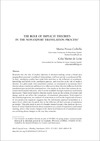Please use this identifier to cite or link to this item:
https://accedacris.ulpgc.es/jspui/handle/10553/58569
| DC Field | Value | Language |
|---|---|---|
| dc.contributor.author | Presas, Marisa | en_US |
| dc.contributor.author | Martín de León, Celia | en_US |
| dc.date.accessioned | 2019-12-16T18:10:54Z | - |
| dc.date.available | 2019-12-16T18:10:54Z | - |
| dc.date.issued | 2014 | en_US |
| dc.identifier.issn | 1889-4178 | en_US |
| dc.identifier.other | Dialnet | |
| dc.identifier.uri | https://accedacris.ulpgc.es/handle/10553/58569 | - |
| dc.description.abstract | Research into the role of implicit theories in decision-making covers a broad area ranging from personal to political relationships, and from private to professional life. To date, translation studies have paid little attention to the influence of translators' knowledge and beliefs in the translation process, and even less to the role of implicit theories. In a pilot study with translation trainees, we attempted to reconstruct their theories about translation and discern to what extent these theories influence both the translation process and the translated text. Our results so far show that trainees do entertain initial implicit theories, which can be modified through experience and formal instruction. These initial implicit theories mainly focus on the notions of transfer and change, and do not reflect the complexity of translation phenomena. With regard to the translation process, our analysis of corrections as well as the length and structure of text-production segments suggests that the informants approach translation at a micro level, which may be partly due to the influence of their concept of translation as transfer. This pilot study is part of a broader research project that analyzes the evolution of initial implicit theories about translation as a result of experience and formal training, and to what extent changes in the theoretical framework of translation trainees can bring about changes in the way they translate. | en_US |
| dc.description.abstract | La investigación del papel de las teorías implícitas en la toma de decisiones cubre áreas tan dispares como las relaciones personales y la política, la vida profesional y la privada. Hasta el momento, la traductología apenas ha prestado atención a la influen-cia de los conocimientos y las creencias del traductor en el proceso de traducción y mucho menos al papel de las teorías implícitas. En un estudio piloto con estudian-tes de traducción, hemos tratado de reconstruir sus teorías sobre la traducción y de averiguar hasta qué punto influyen en el proceso y en el texto final. Los resultados, hasta el momento, muestran que, en efecto, los estudiantes poseen teorías implícitas iniciales y que estas teorías pueden cambiar por efecto de la instrucción formal y de la experiencia. El mayor número de estas teorías iniciales se centra en los conceptos de traslado y cambio, y no reflejan la complejidad del fenómeno de traducir. En lo que concierne al proceso de traducción, el análisis de las correcciones, y también de la longitud y la estructura de los segmentos de producción textual, sugiere que los infor-mantes lo abordan en el nivel micro, lo que en parte se puede atribuir a su concepto de la traducción como traslado. Este estudio piloto forma parte de un proyecto más amplio que investiga la evolución de las teorías implícitas iniciales como resultado de la experiencia y de la instrucción, y en qué medida los cambios en el marco teórico inicial de los estudiantes producen a su vez cambios en sus procesos de traducción. | en_US |
| dc.language | eng | en_US |
| dc.relation.ispartof | Monografias de Traduccion e Interpretacion | en_US |
| dc.source | MonTI: Monografías de traducción e interpretación [ISSN 1889-4178] (1) / coord. por Ricardo Muñoz Martín, p. 273-302 | en_US |
| dc.subject | 570113 Lingüística aplicada a la traducción e interpretación | en_US |
| dc.subject.other | Implicit theories | en_US |
| dc.subject.other | Translation process research | en_US |
| dc.subject.other | Conceptual metaphor | en_US |
| dc.subject.other | Translation patterns | en_US |
| dc.subject.other | Translator training | en_US |
| dc.subject.other | Teorías implícitas | en_US |
| dc.subject.other | Investigación sobre el proceso de traducción | en_US |
| dc.subject.other | Metáfora conceptual | en_US |
| dc.subject.other | Patrones de traducción | en_US |
| dc.subject.other | Formación de traductores | en_US |
| dc.title | The role of implicit theories in the non-expert translation process | en_US |
| dc.type | info:eu-repo/semantics/article | en_US |
| dc.type | Article | en_US |
| dc.identifier.url | http://dialnet.unirioja.es/servlet/articulo?codigo=4799555 | - |
| dc.description.lastpage | 302 | - |
| dc.identifier.issue | 1 | - |
| dc.description.firstpage | 273 | - |
| dc.investigacion | Artes y Humanidades | en_US |
| dc.type2 | Artículo | en_US |
| dc.contributor.authordialnetid | No ID | - |
| dc.contributor.authordialnetid | 170377 | - |
| dc.identifier.dialnet | 4799555ARTREV | - |
| dc.identifier.ulpgc | Sí | es |
| dc.description.esci | ESCI | |
| dc.description.dialnetimpact | 0,0 | |
| dc.description.dialnetq | Q1 | |
| dc.description.erihplus | ERIH PLUS | |
| item.grantfulltext | open | - |
| item.fulltext | Con texto completo | - |
| crisitem.author.dept | GIR IATEXT: Cognición, Lingüística, Texto y Procesamiento de la Información | - |
| crisitem.author.dept | IU de Análisis y Aplicaciones Textuales | - |
| crisitem.author.dept | Departamento de Filología Moderna, Traducción e Interpretación | - |
| crisitem.author.orcid | 0000-0003-4548-9033 | - |
| crisitem.author.parentorg | IU de Análisis y Aplicaciones Textuales | - |
| crisitem.author.fullName | Martín De León, Celia | - |
| Appears in Collections: | Artículos | |
Page view(s)
117
checked on Nov 1, 2024
Download(s)
119
checked on Nov 1, 2024
Google ScholarTM
Check
Share
Export metadata
Items in accedaCRIS are protected by copyright, with all rights reserved, unless otherwise indicated.
